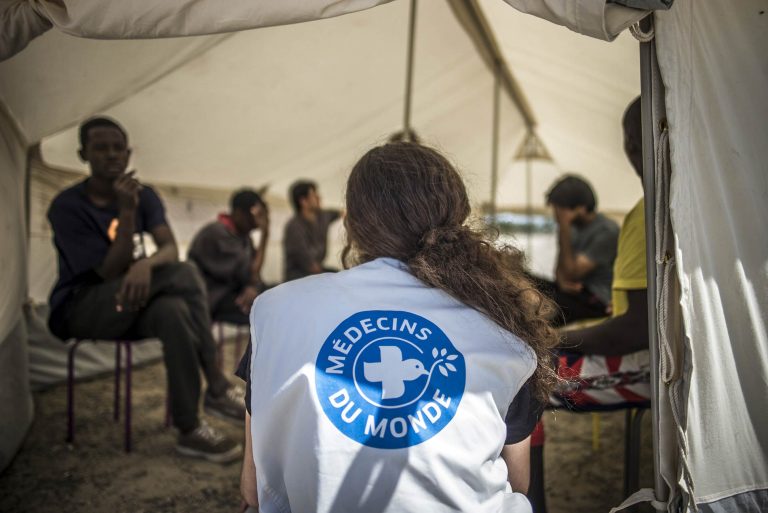JE DÉCOUVRE LE DON MENSUEL
JE DÉCOUVRE LE DON MENSUEL
JE DÉCOUVRE LE DON MENSUEL
JE DÉCOUVRE LE DON MENSUEL
JE DÉCOUVRE LE DON MENSUEL
JE DÉCOUVRE LE DON MENSUEL
JE DÉCOUVRE LE DON MENSUEL
JE DÉCOUVRE LE DON MENSUEL
JE DÉCOUVRE LE DON MENSUEL
JE DÉCOUVRE LE DON MENSUEL
JE DÉCOUVRE LE DON MENSUEL
JE DÉCOUVRE LE DON MENSUEL
JE DÉCOUVRE LE DON MENSUEL
JE DÉCOUVRE LE DON MENSUEL
JE DÉCOUVRE LE DON MENSUEL
JE DÉCOUVRE LE DON MENSUEL
JE DÉCOUVRE LE DON MENSUEL
JE DÉCOUVRE LE DON MENSUEL
JE DÉCOUVRE LE DON MENSUEL
JE DÉCOUVRE LE DON MENSUEL
JE DÉCOUVRE LE DON MENSUEL

Mental health and psychosocial support
© Alessio Romenzi
MdM’s approach to mental health is based on the WHO definition: “A state of well-being in which a person can achieve fulfilment, overcome the normal stresses of life, do productive work and contribute to the life of their community.” In this positive sense, mental health is the foundation for an individual’s well-being and for the proper functioning of a community. It also includes promoting well-being, preventing mental disorders, and the treatment and recovery of people with mental disorders.
Psychosocial well-being and mental health: how are they connected?
Psychosocial well-being refers to the ability of individuals, families or communities to have cognitive, emotional and spiritual strength combined with positive social relationships. This state of well-being encourages the development of life skills that enable individuals, families or communities to understand and participate in their environment and to make positive choices that give hope for the future. The term “psychosocial support” therefore refers to activities that address the psychological and social needs of individuals, families, groups and communities, usually in situations of adversity.
It is a process of building the resilience of individuals, families and communities while respecting their independence, dignity and coping mechanisms. Psychosocial support promotes, among other things, the restoration of social cohesion. It can be both preventive and curative. It is preventive when it reduces the risk of developing mental disorders, for example, and it is curative when it helps individuals and communities overcome and deal with psychosocial problems that may have arisen as a result of shock or the effects of a crisis.
The composite term “mental health and psychosocial support” is used to describe any type of support aimed at protecting or promoting well-being and/or preventing or treating a mental disorder. This term was born out of the joint work of different organisations working in emergency humanitarian contexts. It aims to bring together a range of interventions with common objectives but different modes of intervention. Its use is now being extended to the development community and has been adopted by MdM.

© Olivier Papegnies
MHPS at MdM : our psychosocial support work
MdM has integrated mental health and psychosocial support into its projects since the early 1990s, both in France and internationally. The activities and role of MHPS have gradually developed, due to the increase in the needs expressed and assessed by those supported in MdM’s projects. This led to the theme being mainstreamed into the organisation’s strategic guidelines in 2016. It is a cross-cutting approach, much lik empowerment and the gender approach.
This means that there is a strong potential for integrating MHPS into the organisation’s priority themes and therefore into each MdM project, to enhance the quality of our work and enable a global approach to mental health and psychosocial support issues.
Main principles structuring the approach to mental health and psychosocial support
MdM has structured its mental health and psychosocial support strategy around a few key principles.
Targeting situations of vulnerability
The history of our programmes in various prominent conflicts, has led to a view of MHPS that links psychological distress and vulnerability to the social and political aspects of these crises.
Today, MdM works in a variety of contexts and with a variety of populations, in France and internationally, in which people are very vulnerable. Thus, MHPS interventions are not only aimed at supporting people with specific disorders, but also at supporting all people affected by a situation of psychological vulnerability, especially with a view to prevention.
Strenghtening collective skills as a priority: psychosocial support
The majority of people affected by a crisis situation or who are in a situation of great vulnerability will not necessarily need specific mental health support. All affected groups and individuals have their own resources.
One key principle of our intervention is therefore to activate these resources in order to build individual and community resilience and capacity, and to encourage mutual support.
Where possible, it is important to support the simultaneous capacity building of individuals, civil society and institutions to implement an appropriate MHPS response.
The overall empowerment of all actors in society (individuals, communities and institutions) is central to our interventions.
Going beyond humanitarian principles: approaches to psychosocial support
All organisations providing humanitarian assistance are committed to respecting the main principles of humanitarian intervention: the humanitarian imperative, neutrality, impartiality, accountability, the participation of affected populations, respect for culture, the principle of do no harm and so on.
Two of these principles are particularly highlighted in MdM’s mental health and psychosocial strategy:
- Do no harm: this requires the organisation to have the necessary resources to implement quality interventions and to focus on strengthening existing structures rather than establishing parallel structures;
- The participation and involvement of people at all stages of the projects is essential in our mental health and psychosocial support interventions. This takes place particularly through the development of community health approaches which aim to strengthen the capacity of individuals and communities to act and are more particularly divided into:
- Systematising the realisation of contextual MHPS diagnoses taking into account the analysis of socio-cultural elements before any definition and implementation of projects;
- Building intervention strategies that take into account long-term perspectives even in the context of emergency actions. This is all the more interesting as the organisation has the capacity to intervene in emergencies and to be part of development programmes;
- Providing the necessary means for the implementation of quality programmes, including essential and trained human resources;
- Providing the means to evaluate projects and their impacts.











